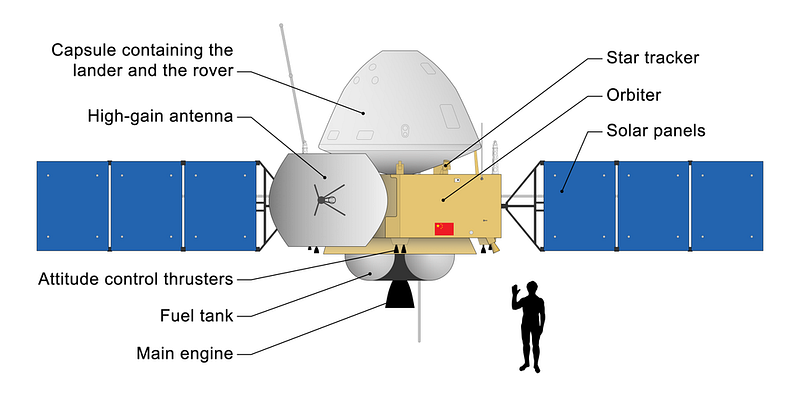A New Era of Space Exploration: The Moon and Mars Race
Written on
The Rise of China in Space Exploration
Many remain unaware that China has become only the second nation, after NASA, to successfully land an unmanned craft on Mars. This remarkable achievement, accomplished in 2021 with the Tianwen-1 mission, is significant even today.
While the Soviets were the first to attempt a landing with Mars 3 in 1971, that probe operated for less than two minutes, casting doubt on its success. NASA's Viking 1 finally succeeded in 1975 after numerous attempts, while the European Space Agency (ESA) has yet to land a surviving vehicle on Mars.
In stark contrast, China’s Zhurong rover is currently the only non-NASA rover exploring the Martian surface, having provided verifiable images and videos from its mission. This success has largely flown under the radar, perhaps overshadowed by more pressing concerns during the post-COVID period.
Why is landing on Mars so challenging? The infamous "seven minutes of terror" describes the average time it takes to land on the Martian surface, during which controllers on Earth are unable to confirm the success of the landing due to communication delays.
Mars presents unique challenges: it has only 38% of Earth's gravity and a much thinner atmosphere—about 100 times less dense. This lack of atmospheric density complicates spacecraft landings, requiring innovative thermal shields and massive parachutes that can effectively deploy in such conditions.
Each step of the landing process must be meticulously timed and fully pre-programmed into the lander's onboard computer. During the descent, Earth-based operators cannot intervene, leading to the anxiety of the "seven minutes of terror."

China’s Ambitions and Global Space Dynamics
Despite my skepticism regarding CNSA's (China National Space Administration) capabilities, their success has been profound. NASA itself has reportedly felt alarmed by China's advancements. As Bill Nelson, NASA's administrator, expressed, we are indeed in a space race. He emphasized that we should be cautious of China's potential claims over lunar territory under the guise of scientific exploration.
This situation bears resemblance to the alternate history depicted in Apple TV+'s series "For All Mankind," where a different outcome in the space race led to ongoing competition and technological advancements.
In this series, the Soviets land on the Moon first, leading to a cascade of scientific breakthroughs and a prolonged space race that ultimately results in human footsteps on Mars by 1994. The creators have masterfully woven humor into this tale of rivalry and innovation.
While Nelson views China's endeavors as a threat, I see them as a significant opportunity. The previous space race spurred immense technological progress and job creation. Reinvigorating competition in space exploration, particularly regarding Mars, could yield similar benefits for both the U.S. and China.
Explore the intriguing aspects of drinking in space with Colleen McLeod Garner in this captivating video.
The Need for a New Space Race
The current geopolitical climate between China and the U.S. resembles a cold war, which could provide the impetus for renewed space exploration efforts. NASA, facing budget constraints since the 1970s, would greatly benefit from such competition.
It’s crucial to consider whether this renewed focus on space exploration should include other potential players, such as Europe and Russia, in the quest for lunar and Martian resources.
Delve into the mysteries surrounding the Moon as NASA's administrator raises alarms about undisclosed information in this thought-provoking video.
In conclusion, I invite you to share your thoughts. Do you view a new space race as an opportunity or a concern? How might global players, including Europe and Russia, factor into this evolving narrative of space exploration?
